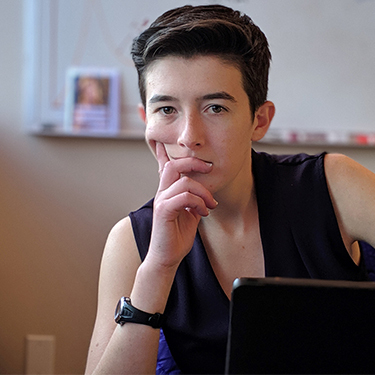Monica Weindling

Name: Monica Weindling
Role: Research Associate
How I got here:
I joined the Humane Genetics team in the fall of 2017 after graduating from Colorado College with a BA in psychology. While earning my undergraduate degree, I completed a thesis about growth and fixed mindsets in youth basketball players. Having been an athlete myself growing up, I was very interested in the effects of coach mindsets and approaches on athletes’ persistence within a sport. When I was applying to jobs after graduating, I saw the opening for the research associate position and a brief description of the project background and goals. 100 pages of reading and two interviews later, I still didn’t quite know what I was getting myself into, but I knew that it aligned well with my personal values, my educational background, and my interest in pursuing social science research.
Why I choose Humane Genetics:
Though I didn’t know fully what I was committing to when I started my work on Humane Genetics, I have remained a member of this team for five years because of what I have learned and the potential I see. Five years has taught me to see variation in the world around me in all kinds of different ways. Being able to understand the beauty and importance in the variety has helped me to understand the ways in which our society succeeds and fails. Being able to understand the complex ways in which biological and societal phenomena occur has also led to a greater appreciation for the need to change large systems, but also that small changes can lead to large downstream effects. I continue to choose Humane Genetics because I think it supports student and teacher learning and understanding of how complex humans are, and sets the groundwork for broader change related to racism, sexism, and other forms of bias. Past the importance and impact of the work, I choose Humane Genetics because of the people I get to work with. From my colleagues at BSCS to the teachers and outside collaborators I get to interact with, everyone is passionate about the work. There is also an understanding that the work takes time, and can only be done when we take care of ourselves along the way. I choose Humane Genetics because I feel valued, because I see the value of it, and because I think it has the potential to make a meaningful difference in the lives of students, teachers, and broader communities.
How my identity intersects with my work:
I engage with my work through an understanding of my privilege and the knowledge that others have not had the same opportunities as I have been afforded. Growing up White in a majority white, middle-upper class community in a liberal part of the country, I know what it means to live a life of relative ease. My time in college and working on this project have helped me to see that my position as a White, able-bodied, middle-upper class, cis-female places me in an unearned position of power and privilege in our society. Because I believe in working towards a more just, fair, and equitable society, I recognize that I can use my voice and position of power to uplift voices and messages that have historically been marginalized. I believe that it is my responsibility to be a part of the change that I wish to see, so that others may walk in society with the same ease that I have for the majority of my life. I will continue to listen and learn from diverse perspectives in order to continue working for change in an equitable and respectful manner.
What I do when working:
As a research associate primarily staffed on the Humane Biology suite of projects, I wear a lot of different hats. Depending on the stage of the project, I may be assisting with curriculum writing, co-facilitating teacher professional learning, leading data collection in classrooms, or working to clean and analyze qualitative and quantitative data.
Other work I’m interested in:
I am currently working on a passion project to develop a curriculum review process to support the creation of anti-bias curriculum, as well as support curricular projects that wish to center a social or environmental justice issue. I am also interested in how Humane Genetics can interact with other disciplines (e.g. social studies), and how to foster healthy learning environments for all learners.
Research Stats:
Over 250 surveys created and sent out for student data collection; over 6,500 survey responses collected and cleaned; 30 think-alouds conducted; 6 focus groups conducted; 3 Humane Genetics Institutes co-facilitated; 2 textbook analysis projects; 4 co-authorships; 2 conference workshops co-facilitated; 1 conference talk co-presented; 1 conference poster co-presented.
What I do with the rest of my life:
I coach two ultimate frisbee teams – one at the college level and one at the adult club level. I try to get out into the mountains for hikes as much as I can. I enjoy baking and eating really good food.
Stats (as of 8/30/2022):
2-time BSCS Science Learning Dessert Bake-Off Champion, 12 Colorado 14ers summitted, FFXIV Level 38 Dragoon, Level 1 Certified Master Resilience Trainer